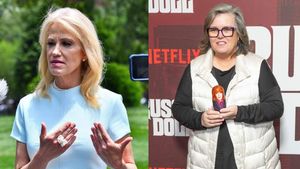Freedom of religion is not absolute — yet it always seems to infringe on the rights of LGBTQ+ people.
Time and time again, the U.S. Supreme Court has ruled in favor of religious entities over queer people seeking equal protection under the law. Legislators across the U.S. continue to push laws allowing businesses to discriminate as they seemingly favor believers over nonbelievers — despite explicit regulations prohibiting it.
So, just how far does religious freedom go? Many human rights experts believe it's already gone too far. Keep scrolling for more information.
What is the Religious Freedom Restoration Act?
The Religious Freedom Restoration Act (RFRA) of 1993 "prohibits any agency, department, or official of the United States or any State (the government) from substantially burdening a person's exercise of religion even if the burden results from a rule of general applicability."
The law was introduced in response to the Supreme Court's 1990 ruling Employment Division v. Smith, which found that "neutral laws of general applicability" do not violate the First Amendment's religious freedom protections. The court ruled against two Native American men who were fired and denied unemployment benefits for using peyote as part of a religious ceremony.
The RFRA was introduced by Democratic Rep. Chuck Schumer and Democratic Sen. Ted Kennedy. It passed the U.S. House of Representatives unanimously and the Senate with only three votes against before it was signed into law by former Democratic president Bill Clinton.
The Supreme Court later ruled that the RFRA was unconstitutional in the 1997 decision City of Boerne v. Flores, determining that it overstepped states' powers. In response to the ruling, 28 states have since passed their own version of the RFRA.
Are there limits to 'Religious Freedom' laws?
The federal Religious Freedom Restoration Act states that the government may burden a person's exercise of religion "only if it demonstrates that application of the burden to the person: (1) furthers a compelling governmental interest; and (2) is the least restrictive means of furthering that compelling governmental interest."
The United States Commission on International Religious Freedom further explains that freedom of religion "is not absolute," and that restrictions can be applied to "for the neutral purpose of protecting citizens" as long as they are "not discriminatory against one religion or belief system or between believers and non-believers."
In simpler terms, the government can not favor believers over nonbelievers or certain religions over others, and everyone is entitled to equal protection under the law.
'Religious Freedom' vs. LGBTQ+ rights cases
"Religious freedom" laws are often used to allow businesses to deny service to LGBTQ+ people. A 2018 study in the National Library of Medicine found that RFRAs "create a significant potential for harm to sexual minorities" by facilitating discrimination that contributed to their "increasing prevalence of unhealthy days."
One of the most infamous examples is Masterpiece Cakeshop v. Colorado Civil Rights Commission, in which the Supreme Court ruled that public accommodations can refuse to serve someone based on their beliefs — in this case, a baker was allowed to refuse making a cake for a gay couple's wedding.
The legal implications go far beyond cake baking — 19 states have "religious exemptions" that in some form allow healthcare providers to refuse to treat people if they are LGBTQ+. The Supreme Court is currently considering Kennedy v. Braidwood Management, Inc., which would allow businesses to deny coverage of life-saving HIV preventative medications.
What is the Hobby Lobby controversy?
Craft supply retailer Hobby Lobby has faced widespread criticism and boycotts for bringing forward the 2014 case Burwell v. Hobby Lobby Stores, Inc., in which the Supreme Court ruled 5-4 that for-profit corporations are exempt from regulations that go against their owners' religious beliefs.
In this case, Hobby Lobby was permitted to deny contraception coverage under employee health insurance plans. The four dissenting judges sharply criticized the ruling for granting corporate entities some of the same rights as individuals.
In response, 19 of the federal RFRA's sponsors, including Schumer, submitted a statement to the court that asserted “Congress could not have anticipated, and did not intend, such a broad and unprecedented expansion of RFRA. Nor did Congress intend for courts to permit for-profit corporations and their shareholders to use RFRA to deny female employees access to health care benefits to which they are otherwise entitled.”
Ways to balance religious freedom with LGBTQ+ rights
Human rights experts maintain that LGBTQ+ rights and religious liberties are not incompatible. They argue that "religious freedom" laws are used not to protect First Amendment rights, but rather to deny LGBTQ+ rights, and that religious liberty ends once it infringes on the rights of others.
Experts at the United Nations have stated that religion is "often deliberately placed in antagonistic positions against the human rights of LGBT persons in social and political discourse, feeding the contention that there is an inherent conflict between them." They maintain that "the right to freedom of religion or belief must not be used as an excuse for violence or discriminatory denial of the human rights of LGBT persons."
Reverend and Democratic Sen. Raphael Warnock wrote in an essay for The Advocate when he was first running for office that religious institutions often "present a false choice between religious freedom and LGBTQ people" in order to "justify injustice against women, minorities, and especially LGBTQ people." He urged Congress to pass the Equality Act, which would guarantee equal protections under the law for all Americans and put an end to the "religious freedom" debate.
"To ensure equality for all, we need comprehensive legislation passed in Congress to enshrine equal rights for all against the whims of bad bills or the changing tides of our nation's highest court," Warnock wrote. "The notion that equal rights are a sacred part of the American promise and who we are is the covenant we have with one another. And the fierce urgency in the voices of LGBTQ people who have waited too long for equal justice under the law demands that we act now."





































































Charlie Kirk DID say stoning gay people was the 'perfect law' — and these other heinous quotes